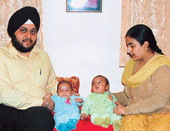 |
| LIFE INSURANCE: Dr Manpreet Kaur and her husband have made the best investment for their twin sons. |
Megha Bagla, a Delhi resident, is expecting her first child this year. While most pregnant mothers would be knitting socks, searching for baby names and following homemade suggestions, Bagla has done something different. She has insured her umbilical cord with LifeCell, a private bank that specialises in storage of these cord blood cells. And she is not alone. Dr Manpreet Kaur, a dentist in Calcutta who recently delivered twins, has also done the same. Bagla and Kaur represent the growing number of Indian parents who are opting to store their cords for future use. Says Kaur: “With new diseases being discovered every year, many of which are life-threatening, I have made the best investment for my children by insuring them against future ailments.” This movement has also seen the likes of Raveena Tandon and Priya Dutt signing up for these services.
Agrees Dr Loveleena Nadir, gynaecologist and an infertility specialist at Fortis Hospitals, Delhi, that five per cent of her patients seek information on cord blood banks. Umbilical cord is the cord that binds a child to his mother before he is born. Cord blood is the blood remaining in the umbilical cord after the baby is born. According to scientific studies, this extra blood, which is usually discarded, contains stem cells that grow and divide into different type of blood cells. Apart from umbilical cord, they are found in the embryo and bone marrow. This blood measures approximately a cupful. Medical studies have proven that this blood when stored can be used to treat a variety of diseases by transplanting.
Stem Cells are the source of platelets and red blood cells and give birth to a body’s immune system.
In India, the first private cord blood bank came up in Mumbai in June 2002. It was set up by the new biotechnology division of Reliance Industries, Reliance Life Sciences (RLS). It has over 3,000 units, and plans to scale up to 10,000 by this year. In 2004, LifeCell was set up in Chennai. Says Abhaya Kumar, managing director, LifeCell: “We have more than 1,200 members registered for cord blood services and are hoping to grow to 15,000 by 2007.”
Expectant parents have to sign up for the services of either of the banks. After this, they receive a medical kit which gives information on how the cord blood is to be collected and stored. LifeCell boasts of a state-of-the-art stem cell processing and storing facility located in Keelakotaivyur in Tamil Nadu, which has a capacity to store up to one lakh samples. Says Prasad Mangipudi, vice-president (Marketing), LifeCell: “We store the cells in two test tubes for a period of 21 years. Depending on the need for a cell transplant, the cells will be given back to the members free of cost.” But, if a child does not require the cells till he has attained 21 years of age, then he will decide whether he wants to continue the storage or register for public cord services,” adds Mangipudi.
RLS has ReliCord-S, which is a sibling donor programme meant for a mother or a family desirous of processing and banking the cord blood stem cells from the present pregnancy. These cells can be used for stem cell transplantation for family members suffering from blood-related disorders, such as thalassemia and leukaemia. A family prone to high incidence of malignancies may also enlist for this service for a probable future use.
RLS provides storage, testing and processing services, including delivery of stem cells to the actual transplant site as per direction received from the transplant physician.
The companies claim that the cells can be used if the child is afflicted with more than 74 diseases like thalassemia, chronic fanconi’s anaemia, WisKott-Aldrich Syndrome, acute lymphoblastic leukaemia, Hodgkin’s disease, and juvenile myelomonocytic leukaemia. LifeCell is also setting up a stem cell transplantation unit in Ramachandra Medical College by next year that would perform stem cell transplants for one-third the price in the US where a stem cell transplant costs as much as $17,000. Reliance is also offering ReliCord-A, a stem cell-enriched umbilical cord blood meant for transplant for a patient with a haematological disorder.
But according to some doctors, there is no conclusive evidence to prove that a child’s stem cells may be used in his lifetime to cure the diseases. S.C. Biswas, associate professor, department of obstetrician and gynaecology, Institute of Post-Graduate Medical Research, Calcutta, says: “The technology is at its early stage and though one would like to believe all claims made by the companies, these stem cells can be used only once.” LifeCell officials agree on the one-time usage, but they are confident that future technologies will permit multi-usability of the cells .
The services do not come cheap. At LifeCell, for Rs 27,000, which includes Rs 5,000 enrolment fee and the remaining as processing fee, one can store the cells for an annual fee of Rs 2,900 for 21 years. RLS charges anywhere between Rs 1 lakh to Rs 1.10 lakh for the first five years of enrolment followed by a nominal fee later. Kumar of LifeCell says the costs will come down in the future as more players enter this segment. Right now the companies are appealing on the emotional level to opt for these services. And parents are buying it. They feel this is too small a cost to pay for securing a child’s future. In fact, the Baglas have opted for a down payment of Rs 59,000 for 21 years. Says Bagla: “When it comes to one’s child, we want nothing but the best.”










